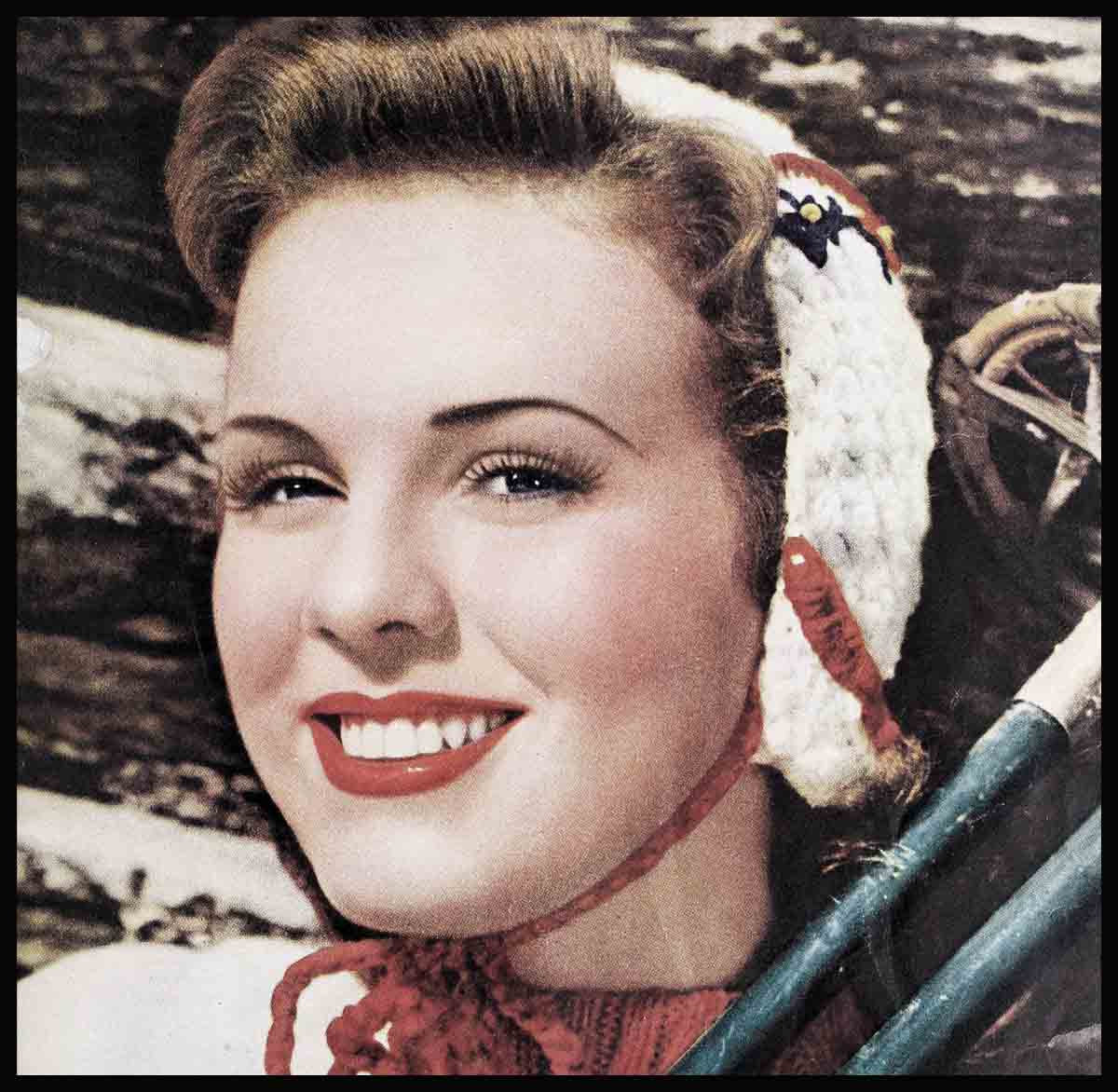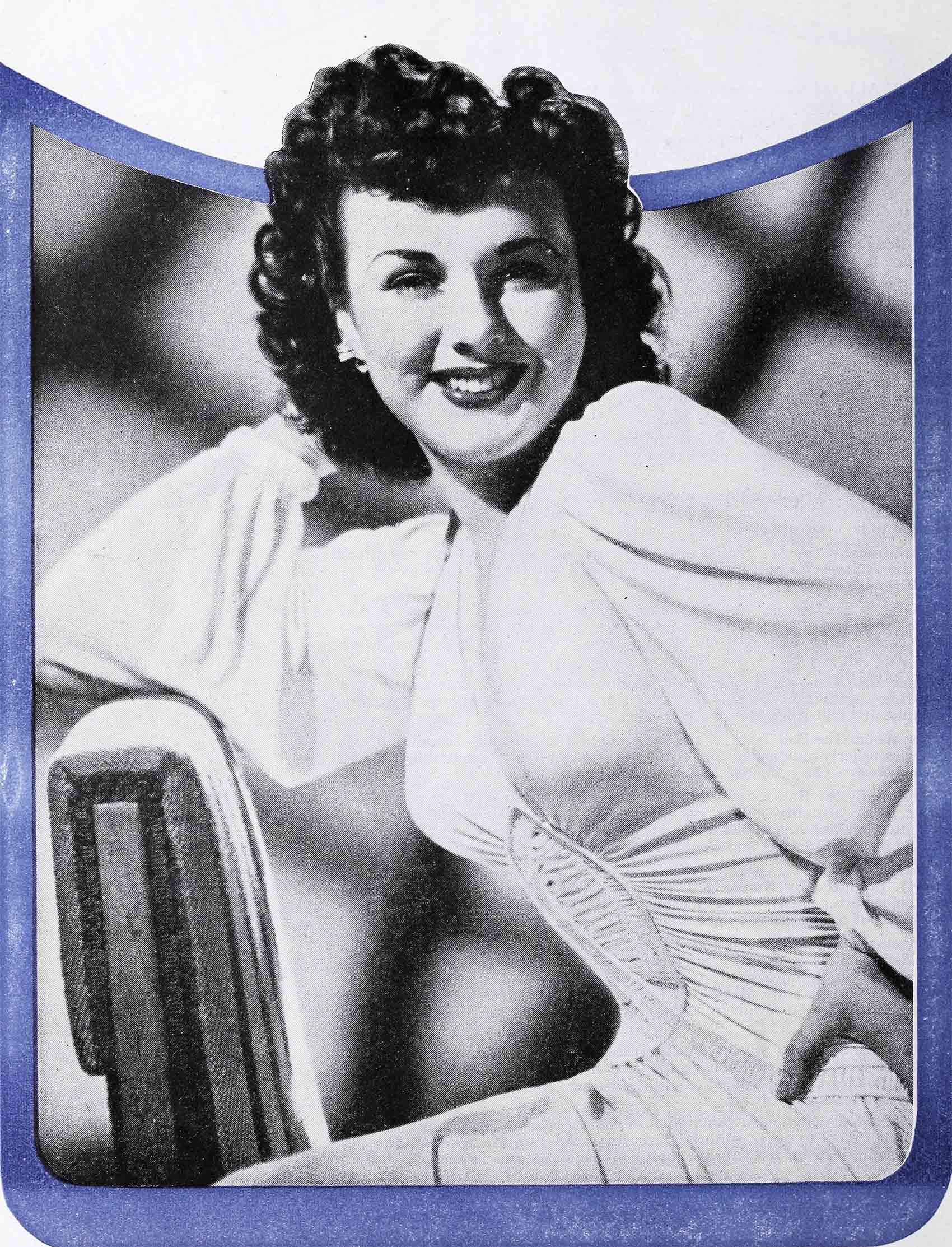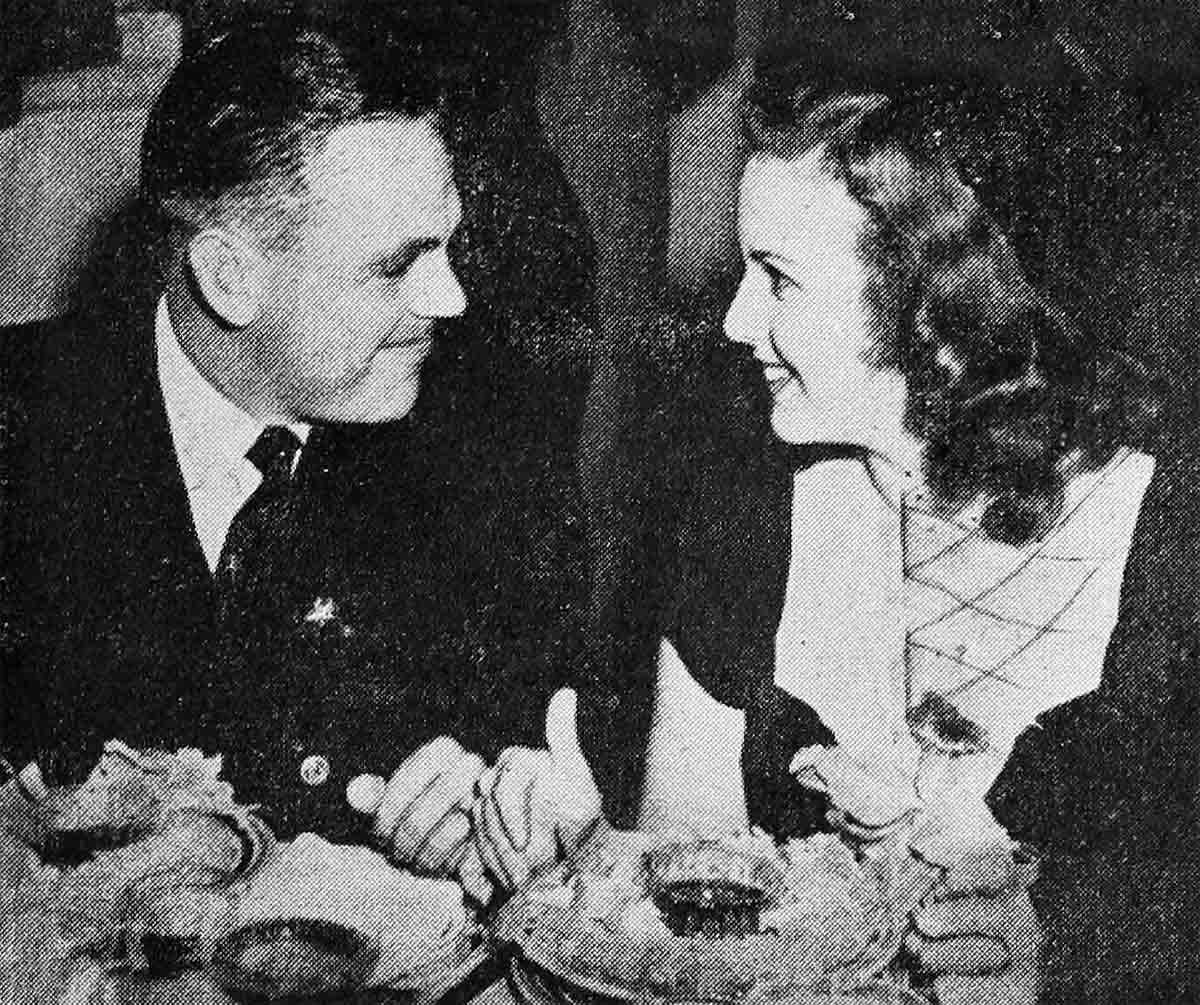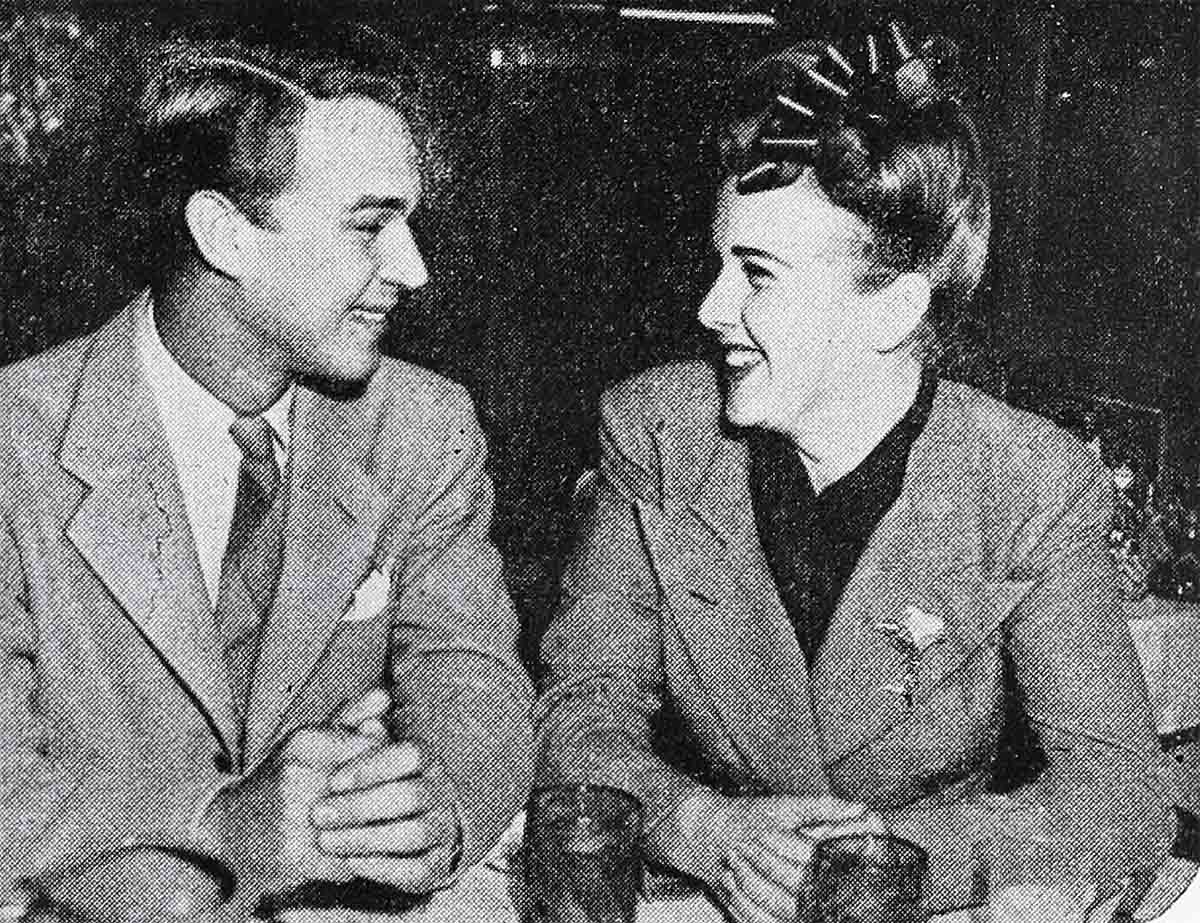
Divorce For Deanna Durbin
The heart-disturbing news that Deanna Durbin is planning to divorce her husband, Lt. Vaughn Paul, comes as a shock to those who still look on her as a child. Incredible that the little girl who had sung her way into the affections of millions would soon be a divorcee. Other Hollywood stars could chalk up broken marriages and change partners, but not Deanna, who, in her way, stood for just as much as Mary Pickford did in the days when she was married to Douglas Fairbanks and reigned as queen of Pickfair.
While movie-goers gasped with shock, those in Hollywood who are up on the latest gossip were not surprised. The talk has been whispered over luncheon tables for a long time that Deanna’s marriage was not so impregnable as her friends hoped.
I, who have a special affection for both Deanna and Vaughn, listened with sadness to the whispers that Deanna was fascinated with her leading man; that she wasn’t getting along with her in-laws and that when her husband—stationed at San Diego—was home on leave she wasn’t seeing him. I must confess I put it down to wagging tongues. I had watched Deanna grow from a child prodigy of thirteen to a charming, beautiful woman and I wasn’t ready to believe this.
However, a month or two before the news of the divorce finally broke I went to see Deanna, who, I have always been proud to say, I prophesied would be a star before her first picture, “Three Smart Girls,” was released in 1936. She had appeared with me in a round-the-world broadcast, which I did for International News Service on the New Year. I was asked to select a young player I thought had the most promise. I selected Deanna. I had seen her first picture and heard her sing, so I didn’t deserve too much credit for thatguess.
Deanna was recording songs when I arrived and I listened until she finished; then she took me to her dressing room where we could talk without interruption.
I said, “Deanna, what are these stories I’ve been hearing about you and Vaughn? Are you having trouble with him? Is there another man?”

“There is no trouble, Louella,” she said in her quiet voice. “And there is no other man. Vaughn is away so much and I cannot stay alone all the time. You should be able to understand how lonely it is for any woman to have her husband away. Your husband was overseas. You know how dreary it is to stay home every night.”
She looked me straight in the face when she said this, but her gray eyes were troubled. Deanna’s honesty has always been one of her greatest charms. I believe she thought she was telling the truth. But I doubt if the war had anything to do with the break-up of Deanna and Vaughn. I also think it would be unfair to boys who are in service and who wonder if their wives are willing to wait to suggest that this was the case.
Vaughn was Deanna’s first love. She was scarcely eighteen when she married. Now she is a woman. So often the man who is right for the girl is not right for the woman. That’s why early marriages frequently are a mistake. Those of us who find divorce so deplorable and wish there might be some way it could be avoided realize there should be no marriage until a girl is absolutely certain a man is the only man she wants to spend her life with, the one to whom she will be able to turn in every trouble.
Talking to Deanna that day I found her a slender, beautiful woman, poised and self-assured. The little girl who used to send me notes of thanks for my interest in her career had disappeared, together with the baby fat that used to irk her so. She had become a glamour girl and, as a glamour girl, was apparently enjoying the knowledge that she had become very attractive to men. Every woman likes to feel that she inspires admiration and Deanna is no different from any other daughter of Eve. Some weeks after I saw Deanna, others close to her asked questions.

“I do not want to discuss it,” she told them. “Vaughn and I have been drifting away from each other for the past year. Perhaps it is his long absences. Perhaps it is the misunderstandings we never have been able to adjust. I am sorry and I know Vaughn is, but there seems to be nothing either of us can do to avoid a break.”
Following this was her statement to the press:
“It is with deep regret that Mr. Paul and I have found it impossible to continue our marriage. As a result I am taking legal steps to have the marriage terminated. Our marriage was embarked upon with all the sincerity and hopes that should go with marriage. But circumstances that neither of us has been able to solve now make it imperative to part to assure our individual welfare and happiness.”
That was a cold statement, dictated probably under the stress of the moment. Vaughn himself went to his parents’ home, the Val Pauls. He took not a stick of furniture from the beautiful home he and Deanna shared. He left the Brentwood mansion intact, just as his parents had given it to them, their marriage gift years ago. It was Val Paul, who is now ill, who was in charge of the studio when Deanna made her first big success. Later Vaughn became an assistant director there. The Pauls loved Deanna as dearly as if she were their own child, so the parting brought unhappiness to them—more unhappiness than if they hadn’t been so fond of her.

THIS broken marriage will be the subject of criticism, for movie-goers have always placed Deanna on a pedestal. Yet, who is there to know what really brought about the final break.
I have always felt particularly close to Deanna. I believe I was the first newspaper woman to whom she confided her secret—that she was to marry her assistant director. I was on a personal-appearance tour at the time and I’ll never forget the happiness in her voice when she told me, over the long-distance telephone, that her parents were announcing her engagement the next day. “I wanted you to know, Miss Parsons,” she said, “you have always been so good to me.”
I remember, too, how she looked after her engagement was announced. She came to my house to a cocktail party I was giving for Kate Smith. She was wearing a bright red dress and her first mink coat. Her engagement ring, of which she was so proud, was really her first piece of valuable jewelry. She was a plump girl—shy and sweet. My heart went out to her. I loved her, and Vaughn too. They were so young and so deeply in love, so untouched by life’s realities that were later to bring them such unhappiness.
When Deanna said her marriage vows she was as unsophisticated, as pure in heart and as sweet as is the little girl who lives next door to you in your home town. She had saved herself for the man .she married. No breath of scandal ever had touched her. She had never been seen going to out-of-the-way places with ardent young men. She loved only one, and to him she gave her heart and herself. Writers gushed with stories of this perfect marriage—and it seemed as if it were perfect.
It was on April 18, 1941, the thirtieth anniversary of the Durbins, that Deanna, once described as a Jenny Lind of the movies because of her God-given singing voice, and Vaughn Paul were united at a conventional church wedding. She was a beautiful bride and those of us who watched her go to the altar in her virginal white, with flowing tulle, her orange blossoms and her bridesmaids, said a prayer in our hearts for her happiness.
Six months later she was to prove how deeply she loved her husband. When Universal did not give Vaughn the chance he felt he was entitled to—to direct—she took his dismissal as her dismissal. Although she was at the zenith of her fame, when an absence from the screen is bad for an actress, she walked out on her million-dollar contract.
“Darling,” she told Vaughn, “do whatever you want; I’m with you to the end.”
This, of course, was a mortal blow to Universal—whom she previously had saved from bankruptcy. Studio bosses had conference after conference. Among other things they asked Vaughn, please, would he come back. They agreed he could direct. Vaughn, however, had too much pride to take any job offered him because of his wife’s fame. He didn’t return and neither, at that time, did Deanna.
Joe Pasternak, long Deanna’s producer, wasn’t surprised by her stand. He said, “She has the strongest character I ever saw in a girl. She never will let her husband down.”
Later Deanna said it wasn’t only Universal’s treatment of her husband that made her walk out, that it also was their refusal to let her sit in on her stories or to select her directors.
Then came the war and Vaughn went into Uncle Sam’s service. Whereupon, with Universal’s promise that Deanna might have a choice in her stories and her directors, she went back to work.
“I’ve never been happier in my life,” she told me at this time. “I sit in on all the conferences. If the pictures aren’t good I know it is as much my fault as Universal’s. I give my approval and I can only blame myself if things go wrong.”
Perhaps the words she spoke seemed true to her then but the look in her eyes didn’t bear them out. It made me wonder.
Her first picture after she came back wasn’t good. She had lost something with her public. The world is a fickle thing and during the six months she had been idle there were other girls and other singing stars to take her place.
I cannot help but wonder if, in her heart, Deanna didn’t come to feel it had been foolish for her to remain off the screen. And it might be that her marriage would have endured if Vaughn had forbidden her to walk out of Universal when he resigned his job. A woman can make a sacrifice such as Deanna made, but nine times out of ten she lives to regret it.
Vaughn, however, is as ambitious and hard-working as Deanna herself. Unconsciously, I think, he was embittered by his failure to keep professional pace with her. Few men like to feel their wives are more successful than they are and, while they may not show it outwardly, inwardly it is a bitter pill.
Also, Vaughn is an only son, adored by his parents and in his way just as spoiled as Deanna. In marriage, either the wife or the husband has to make sacrifices and give in. Deanna told one of her friends that either she or Vaughn would have to change if they were to continue. And in this case, apparently, there was no compromise.
So Deanna is to be divorced. The studio wishes it were otherwise, but they will stand back of her. So will her friends. We all wish, of course, it might have been avoided. At the same time we hope she won’t make the mistake of rushing headlong into another marriage. It would be tragedy if Deanna, the ideal of so many girls, should rush from one marriage to another, should become just another Hollywood divorcee.
THE END
—BY LOVELLA O.PARSONS
It is a quote.PHOTOPLAY MAGAZINE JANUARY 1944




